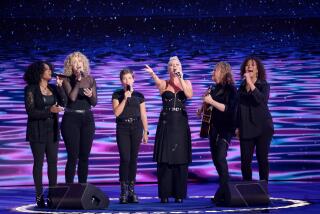Second City Counts on Corporate Cash to Impress Its No. 1 Guests
- Share via
CHICAGO — From opulent buffet dinners to bottomless cocktail glasses, from grip-and-grin receptions to boisterous parties in nightclubs, the business of this convention has been undergirded by a web of corporate and lobby sponsors.
While the Treasury provides $12.5 million each to the Democrats and Republicans to help them stage their respective conventions, that’s barely a down payment.
Chicago ‘96, the local host committee, has collected a lot more from private donors to make sure the event could live up to its grand pretensions.
Their hope, say local leaders and convention organizers, is that Chicago would shine before the nation and make a valuable impression on the nation’s political and business elite.
But critics see the private sponsorships as another facade behind which corporate interests exert influence over government and its leaders.
“Money is flowing in so many different directions it’s hard to count the bottom line,” said Paul Hendrie, managing editor at the Center for Responsive Politics, a Washington-based watchdog group.
The conventions are a particularly good example of the quandary of campaign finance: how to stage the elaborate processes of democracy without overburdening the taxpayers with high costs or contaminating the results with private influence. The question becomes all the more vexing when the event at some points resembles a rowdy office party more than a somber electoral function.
A full and accurate accounting of the total spent on Democratic convention activities will not be available for at least 60 days after the convention ends.
But Dennis Culloton, a spokesman for Chicago ‘96, estimated that the convention host group will have raised $25 million to help pay for convention and visitor costs.
Judging by the daily roster of social events--many are not official activities and are therefore not subject to federal accounting--the final tally of corporate dollars spent in Chicago is likely to soar even higher.
And in spending these millions, companies and lobbying groups clearly were able to put themselves in the closest proximity to--and good graces of--those in Congress and the executive branch of government.
For example, one typical day among the Democrats this week began with an invitation-only breakfast in Private Dining Room No. 1 at the Hilton Hotel. The event was sponsored by the National Federation of Independent Businesses, an organization that always has an assortment of issues in play before Congress and government agencies.
At midmorning, the National Beer Wholesalers Assn. invited moderate House Democrats to a brunch. For lunch, Emily’s List, a group devoted to getting women elected to public office, played host to a lunch. MTV provided a free concert with the band Sponge at the Navy Pier.
After dark, there were even more offerings. One event, sponsored by the Creative Coalition and the Democratic Congressional Campaign Committee, took over the local Planet Hollywood, with the spill-over jamming nearby streets.
To be sure, the same kind of lavish entertaining was present at the Republican convention in San Diego, where party officials set and met a high threshold for fund-raising. The San Diego Host Committee, which served as the official sponsoring group, collected more than $13 million to showcase the nomination of Bob Dole and Jack Kemp as the party’s standard-bearers.
By contrast, Chicago ’96 set a fund-raising goal of $9 million. In 1992, when Bill Clinton and Al Gore were nominated in New York City, the host committee raised $6.5 million.
But the Chicago organizers found no shortage of businesses and donors eager to line up as sponsors.
By last week, 74 groups or people were honored as $100,000 “vice chairs” of the convention. Others received lesser honors for donations of $75,000, $50,000 and $25,000. “We were successful beyond many people’s wildest dreams,” Culloton said.
In addition to a profusion of cash, the Democrats were given another $3 million in free goods and services. An additional $7 million came from the state of Illinois in matching funds and $5.4 million from the city, based on tax revenue generated by increased spending in Chicago, he said.
Bill Brandt--owner of Development Specialists Inc., a financial management firm with operations in Chicago, Miami and Los Angeles--said his firm happily contributed $100,000 and expects nothing in return.
“It was done for one of the most bizarre reasons you could imagine--altruism and love of the city of Chicago,” said Brandt, who is a major contributor to the Democrats and was invited to a White House state dinner for Irish President Mary Robinson this summer. “I’m not the phone company or an airline who can use politics to get people to use my services. It would be hard for me to throw a party hoping to cash in on bankruptcies. Nobody would come if I did.”
Sen. Christopher J. Dodd of Connecticut, the Democratic Party general chairman, said he sees nothing wrong with private groups wining and dining Democratic officials and paying for the party’s convention. “I’m much more concerned about campaign-finance reform than I am that people show up at the aquarium for cheese dip,” Dodd said.
But Hendrie at the Center for Responsive Politics said the potential danger of so much private money is the reason Congress in 1976 voted to authorize public financing of the conventions.
In the end, the political parties were able to use the local convention host committees to ensure that they got their public money and their private money too.
Times staff writer Sara Fritz contributed to this story.
More to Read
Get the L.A. Times Politics newsletter
Deeply reported insights into legislation, politics and policy from Sacramento, Washington and beyond. In your inbox twice per week.
You may occasionally receive promotional content from the Los Angeles Times.










